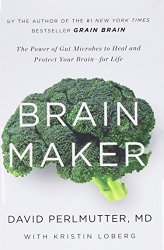
Brain Maker: The Power of Gut Microbes to Heal and Protect Your Brain–for Life.
If what Dr. David Perlmutter writes in this book is true, then our current health care system needs a serious overhaul as we seem to be going in the wrong direction in some important ways. However, I think the author may be jumping the gun just a little in his claims of what changing ones diet can really do. While improving one’s diet can certainly make a major difference in a person’s health, correcting gut bacteria won’t always correct all health problems, as he seems to imply.
However, the references to the research are there, and so far, other then the cost of the book, I don’t see any magical product that he’s trying to sell, just the information in the book, which leads me to believe the author has pure intentions.
The author does admit later in the book that much of the research that his claims are derived from is still in its infancy, and requires more studies. However, the recommendations he makes in the book in regards to diet, will harm no one, will probably improve the health of many, and if one is afflicted with any of the conditions he discusses, I certainly don’t see any harm in trying his recommended diet. I was actually quite proud of myself because I eat at least half the foods he recommends. Unfortunately, I also eat some foods he doesn’t recommend, so, I’m going to slowly eliminate the grains out of my diet, and eat more of his recommended foods. That’s how convinced I was after reading his book that his analysis is correct, or at least on the right track.
I did laugh a little at his recommended meal plans, not because they are bad, but because no one eats so little. I shouldn’t laugh, as in reality, that just tells me that as a society, we are all over eating, and thus in the long run, we are harming our health by doing so. If one is serious about making such dietary changes, it may require accepting that the amounts and meal types in this book may leave one feeling a little hungry until the individual is used to eating the recommended amounts of food. This is of course only compared to how we as western society eat now, but not really if one looks at it from a global or historical perspective.
What he didn’t cover is activity level and amount of calories. You obviously need more calories if you’re physically active, and less calories if you’re not. I think his recommendations are based on sedentary individuals who don’t go to the gym three times a week, or have physically active hobbies.
Regardless, if his claims and research prove to be true, then many people will be empowered to take their health more into their own hands, and live a healthier life. From a scientist’s perspective, I find his hypotheses and deductions to be sound, plausible, and often necessary. If anything, the claims the author is making should be picked up by the scientific community, and thoroughly examined and tested. As this doctor/author is onto something big.
I originally listened to this on audio-book, and then immediately bought a physical copy. The audio-book was okay, but I wouldn’t recommend it as there are lots of resources you want to be able to reference, especially if you are a science geek. Also, the accompanying PDF file with extra information wouldn’t download for me, so I wasn’t able to look at the referenced information. Thus I bought the physical book in order to have the information handy and easy to reference.
I also didn’t care for the audio-book because I found myself and my hubby pausing constantly in order to discuss the information provided. The book is scientifically dense, and you do not get the general experience of listening to an entertaining book, instead, we found ourselves constantly pausing, re-winding, and Googling for additional information. This is not to say that you shouldn’t listen to it as an audio-book format, especially if that is how you find time to read books (that is the only way I find time to read books), then it would be useful. But again, the information provided I think is best served in physical form.
Of note, I would like to say to not judge the book by the first couple chapters. It was difficult reading as it sounded like one of those infomercials trying to sell you a cure-all for $9.99, except in this book it sounded like he was trying to sell you the idea of eating yogurt. But once I got through the initial first couple of chapters, the information I was seeking started to emerge, and then I was hooked.
Written by a doctor using scientific terms, the author tries to simplify the complex and sometimes difficult research. However it is expected that you are familiar with body processes, scientific research, and maybe some concepts of how digestion works. Interestingly, from a scientist’s perspective, I found the book to be too simplified, but from a layman perspective, I found it to be complex, but if one re-reads a few concepts, or Googles certain terms, it is easy to understand. So while sometimes dry and sometimes challenging to read, that is the result of such a complex topic.
Overall, it’s a great book, full of useful information, shocking concepts on our current health-care, and if you first start to doubt what you are reading in the first couple chapters, just remind yourself, that if prescription medication given in pill form that you swallow work on the brain, why wouldn’t what you eat also work on the brain?
Nature's Complement is a participant in the Amazon Services LLC Associates Program, an affiliate advertising program. If you purchase products on Amazon through any of our affiliate links, we get a small percentage of the transaction, at no extra cost to you. We spend a lot of time writing the articles on this site, and all this information is provided free of charge. When you use our affiliate links, you support the writing you enjoy without necessarily buying our products. (However we would appreciate if you would do that too!) Thank you for helping to support our work, however you choose to do so.
These statements have not been evaluated by the Food and Drug Administration. This information and/or products are not intended to diagnose, treat, cure or prevent any disease.


